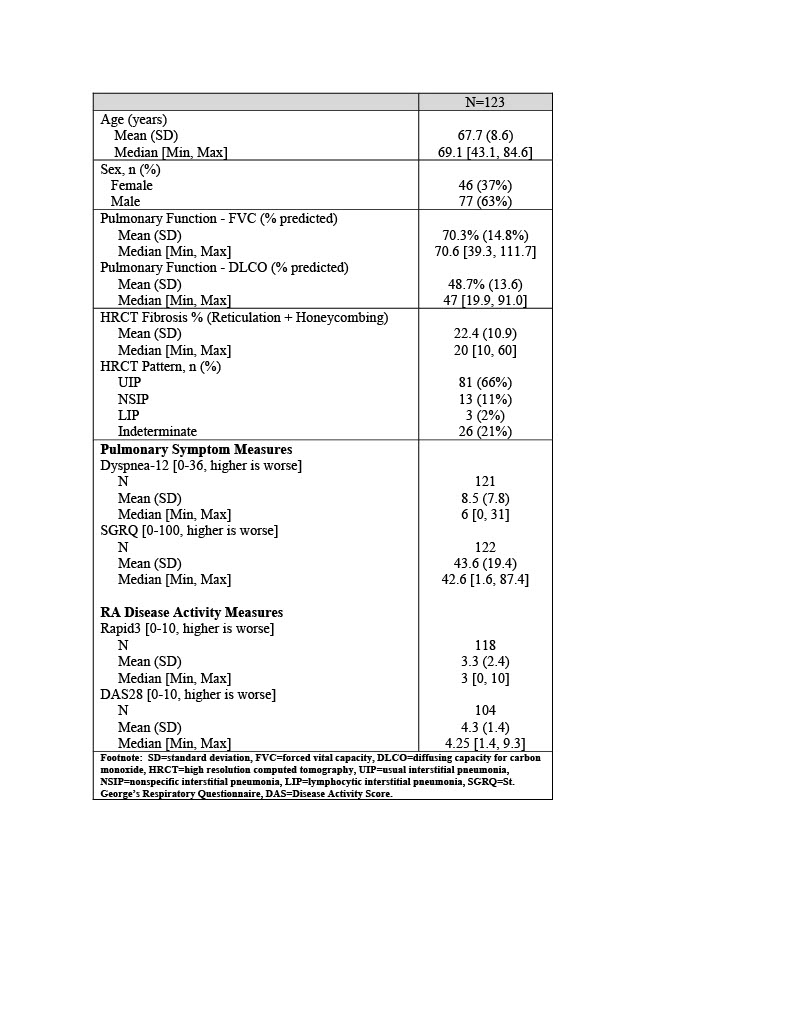Session Information
Date: Sunday, November 7, 2021
Title: Patient Outcomes, Preferences, & Attitudes Poster II: Measurements (0739–0763)
Session Type: Poster Session B
Session Time: 8:30AM-10:30AM
Background/Purpose: Both rheumatoid arthritis (RA) and idiopathic pulmonary fibrosis (IPF) have established measures of disease severity and patient reported outcomes (PROs) that measure health-related quality of life (HRQL). In IPF, established PROs correlate with severity of lung disease. In patients with interstitial lung disease (ILD) associated with RA, it is unknown if established RA disease severity indices and PROs correlate with ILD severity and available PROs used in IPF, which have been adapted for use in the TRAIL1 trial. Using baseline data collected in the TRAIL1 trial, we sought to examine correlations between PROs, measures of RA disease severity and severity of ILD and correlations between PROs used in RA and IPF.
Methods: Baseline data from 123 subjects randomized to the TRAIL1 trial were used for this analysis. All subjects underwent pulmonary function testing (PFT), baseline high-resolution computed tomography (HRCT) to determine extent of fibrosis and administration of PROs at enrollment. Disease severity for joint disease was measured with the disease activity score (DAS)28 in RA and disease severity for ILD was measured using forced vital capacity (FVC)%, diffusing capacity for carbon monoxide (DLCO)% and extent of fibrosis in ILD. PROs examined include the RAPID3 in RA and the St. George’s Respiratory Questionnaire (SGRQ) and Dyspnea-12 for ILD. Spearman’s rank correlation test was used to evaluate the relationship between candidate variables and correlation coefficients (r) were calculated.
Results: Table 1 shows the baseline characteristics of the subjects randomized for the TRAIL1 trial. Most subjects were Caucasian males over 55 years old with a moderate amount of fibrosis. Baseline PROs revealed moderate RA activity; dyspnea and pulmonary-specific HRQL (as measured by the SGRQ) showed moderate impairment that was comparable to that seen in IPF. There was no association between DAS28 or PROs and disease severity for ILD (Table 2). There were strong correlations between the RAPID3 and the ILD-specific PROs (SQRQ and Dyspnea-12) (Table 3).
Conclusion: No correlations between joint-disease activity and RA-ILD disease severity as measured by PFTs and extent of fibrosis on HRCT were shown. Additionally, no correlations were apparent between ILD-specific PROs and severity of lung disease in RA-ILD, as is seen in IPF. While the small patient numbers may impact the results, these data suggest that RA-ILD has features that are unique compared to IPF, perhaps related to the systemic nature of the disease as well as the multicompartmental lung involvement that can be seen in RA. These differences may require the development of specific PROs that better correlate with lung function in the assessment of patients with RA-ILD. Furthermore, the correlation between RA and ILD-specific PROs may be important in the clinical management of patients with RA-ILD and requires further study.
To cite this abstract in AMA style:
Dellaripa P, Doyle T, Danoff S, Goldberg H, Kolb M, Chambers D, Woodhead F, Spino C, Rosas I, Solomon J. The Performance of RA Disease Activity and Patient-Reported Outcomes in Rheumatoid Arthritis-Associated Interstitial Lung Disease in a Prospective Trial Using Pirfenidone in RA ILD (TRAIL1) [abstract]. Arthritis Rheumatol. 2021; 73 (suppl 9). https://acrabstracts.org/abstract/the-performance-of-ra-disease-activity-and-patient-reported-outcomes-in-rheumatoid-arthritis-associated-interstitial-lung-disease-in-a-prospective-trial-using-pirfenidone-in-ra-ild-trail1/. Accessed .« Back to ACR Convergence 2021
ACR Meeting Abstracts - https://acrabstracts.org/abstract/the-performance-of-ra-disease-activity-and-patient-reported-outcomes-in-rheumatoid-arthritis-associated-interstitial-lung-disease-in-a-prospective-trial-using-pirfenidone-in-ra-ild-trail1/



